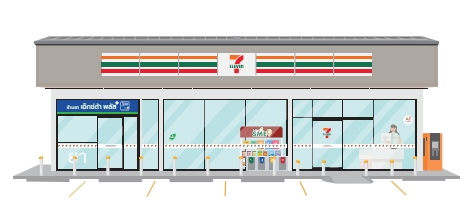Emphasis on All Material Issues for Sustainability in All Dimensions
CP ALL Plc. and its subsidiaries (“the Company”) has continuously published its sustainability report for the 9th consecutive year, serving as a communication channel for performance under sustainable development policies and strategic frameworks, informing all stakeholder groups. This is inclusive to the Company’s, environmental, social, and governance and economic dimension.
Published performance cover the period of 1 January to 31 December 2024, encompassing 3 key business units. In 2024, the Company’s net revenue was at 987,794 million Baht. Additional information regarding subsidiaries is disclosed in on page 2 of 2024 56-1 One Report (Annual Report).
This report’s content was established upon the foundation that is the Company’s overview operation and material topics affecting 3 dimensions of sustainability, all according to every stakeholder group’s perspective and key impact assessment. The reporting framework aligns with international sustainability reporting standard 2022 edition (GRI Sustainability Reporting Standards 2021: GRI Standards 2021) and The Food Processing Sector Supplement. Simultaneously, the Company assigned an internationally reputable and credible third-party, LRQA (Thailand) Limited to verify the report.
In 2024, the data set reviewed comprises GRI 2-26, GRI 2-27, GRI 3-1, GRI 301-1, GRI 301-2, GRI 302-1, GRI 302-3, GRI 303-3, GRI 303-4, GRI 303-5, GRI 305-1, GRI 305-2, GRI 305-3 Other indirect (scope 3) GHG emissions (Purchased goods and services, Capital goods, Fuel and energy related activities, Upstream transport & distribution, Waste generated in operations, Business travel, Employee commuting, Downstream transport & distributions, Use of sold products, End-of-life treatment of sold product only and Downstream leased assets), GRI 305-4, GRI 306-3, GRI 306-4, GRI 306-5, GRI 308-1, GRI 308-2, GRI 403-9, GRI 403-10, FPSS FP6, FP7, GRI 405-2, GRI 414-1, GRI 414-2.
Retail business Convenience store

Convenient Store Service
Wholesale and Retail businesses Service

Wholesale Service

Retail Service
Others

Financial Service

Information Service

Food, Bakery, and Ready-To-Eat Meals Service

Marketing Media Services

Educational Service

Logistic Management Service
Determining the Report’s Content
The Company developed the report by considering and assessing significant impacts to every group of the Company’s stakeholders, addressing both positive and negative impacts. Considerations are also given to sustainability material topics from internal factors in business operations, and external factors of global trends among peers, including world-renown sustainability indices as the Dow Jones Sustainability Indices (DJSI), Sustainability Accounting Standards Board (SASB), the Securities and Exchange Commission (SEC), and Sustainable Development Goals (SDGs) This ensures the Company’s sustainability performance disclosure is in accordance with the 8th reporting principles, as follows:
| Global Reporting Initiative Standards (GRI) | |
|---|---|
| 1. Accuracy | Disclosed data accuracy |
| 2. Balance | Balance of performance reported, both positive and negative |
| 3. Clarity | Comprehensibility for all stakeholder groups |
| 4. Comparability | Data compatibility to illustrate performance trend |
| 5. Completeness | Data completeness and comprehensiveness |
| 6. Sustainability context | Balance of performance reported, both positive and negative |
| 7. Timeliness | Scope of reporting timeline |
| 8. Verifiability | Verifiability |
Double Materiality Assessment Process
The Company has a process and procedure for assessing material topics (Materiality Assessment) by considering the impact on stakeholders (Impact Materiality) and evaluating the risks and opportunities for the Company’s business operations (Financial Materiality). This assessment follows the “Double Materiality Assessment” approach to provide stakeholders with decision-making information. The process consists of four main steps as follows:
| Identify and assess impacts on continuously basis | |
|---|---|
| 1. Understand the organization’s context | The Company has studied and gained an understanding of business activities at every stage of the value chain to obtain a comprehensive overview of operations and potential impacts. CP ALL has also identified relevant stakeholders, both internal and external, such as employees, customers, suppliers, communities, and shareholders. Subsequently, the Company analyzed the needs and expectations of each stakeholder group, linking material topics in environmental, social, governance, and economic aspects with business activities. This process considers alignment with global trends and relevant human rights issues while analyzing both positive and negative impacts of business activities on each stakeholder group throughout the value chain. |
| 2. Identify actual and potential impacts | The Company comprehensively considers the context and impact of material topics, encompassing both actual and potential impacts. This is accomplished through an analysis of stakeholder impacts (Impact Materiality) from social and environmental dimensions, including both positive and negative impacts. The evaluation also considers short-term and long-term impacts and assesses the ability to restore and remedy impacts (Irreversible & Reversible Impact). These material topics are assessed in alignment with the Company’s business operations and specific context through interviews and surveys (BHC and Online Questionnaire) with both internal and external stakeholders. In addition, the Company evaluates the risks and opportunities that may affect business operations (Financial Materiality) to identify related risks and opportunities for sustainability. The assessment follows the Double Materiality Assessment approach by considering the Company’s social and environmental impacts alongside social and environmental factors that may affect the Company’s financial performance. |
| 3. Assess the significance of the impacts |
The Company considers the material topics identified in Step 2 alongside the nature of CP ALL business operations and organizational context to assess the impact on stakeholders (Impact Materiality). The assessment criteria include the severity of impact (Scale), extent of impact (Scope), ability to remedy or restore (Remediability), and likelihood of occurrence (Likelihood). Additionally, business risks and opportunities (Financial Materiality) are evaluated in conjunction with survey results from stakeholders. The Company then held a workshop with relevant departments, including the Sustainability Audit Unit, Corporate Sustainability Management Office, Enterprise Risk Assessment Committee, and executives responsible for risk management, such as the Executive Committee and Executive Officers. The purpose was to assess the Impact Rating Scale and the Probability Rating Scale before prioritizing material topics that affect the Company’s operations. |
| Determine material topics for reporting | |
| 4. Prioritize the most significant Impacts for reporting |
The Company analyzed and reviewed the material topics identified from the workshop in Step 3 to prioritize significant issues for business operations while considering the relevance and alignment with the organizational context. Additionally, the Company has a process for testing material topics (Material Testing) by engaging food industry experts (Expert Testing) to develop business strategies. The results from this testing are presented to the Sustainability Development Subcommittee, Executive Committee, and the Board of Directors for endorsement. The prioritization process takes into account the influence on stakeholders’ assessments and decisions, as well as the importance in terms of economic, social, environmental, and human rights impacts. |
Summary of Expert Testing Interview on Sustainability Issues
Experts view that CP ALL is facing multiple challenges and risks related to sustainability. However, at the same time, there are numerous opportunities to create positive impacts and enhance long-term business sustainability. Prioritizing these issues and implementing effective operations will be key factors in ensuring CP ALL success and sustainability in the future.

Packaging waste remains a significant challenge for the retail sector, as most packaging is designed for convenience but often becomes waste after consumer use, leading to environmental impacts. This issue is particularly critical for packaging that carries a company’s logo, as it directly affects corporate image. Developing sustainable packaging solutions and encouraging consumer participation in packaging management are essential steps toward addressing this challenge.

Climate Resilience and Business Adaptation: Consumers are increasingly prioritizing low-carbon products, posing a challenge for businesses to adjust their operations and restructure production processes, potentially leading to higher operational costs. While domestic market impact may be minimal, global markets, exports, and international regulations place significant emphasis on low-carbon products.

Efficient use of energy and resources is crucial in mitigating environmental impacts and reducing greenhouse gas emissions, a challenge faced globally. CP ALL should emphasize the adoption of clean energy, minimizing natural resource consumption, and implementing effective waste management strategies to enhance sustainability.

Skilled personnel are a key driver of business success. Attracting, developing, and retaining high-quality employees is essential. CP ALL should invest in employee capacity-building, foster a positive work environment, and provide opportunities for continuous learning and
career growth.

The conservation of nature and ecosystems is a fundamental pillar of sustainable development. CP ALL should actively participate in environmental conservation and restoration, support sustainable agriculture, and minimize the Company’s impact on biodiversity.

An efficient and responsible supply chain is crucial for business sustainability. CP ALL should prioritize selecting partners who conduct business with social and environmental responsibility, promote fair labor practices, and minimize environmental impact at every stage of the supply chain. Additionally, sustainable sourcing in food production plays a vital role in long-term sustainability, both upstream and downstream, from raw material procurement to processing and final product development.

Social Impact and Economic Contribution: Small-scale entrepreneurs continue to face challenges in meeting food safety standards. Supporting agricultural processes and production standards for local SMEs and community enterprises is crucial for enabling them to produce high-quality, compliant products. This support will help ensure consumers have access to safe and sustainable food sources.

Assessing Impacts of Material Topics
| Material topics | Impacts on society/Environment and business value drivers | The potential or actual impact (Negative/ Positive) | Business drive (Risks/Opportunity) |
|---|---|---|---|
| Climate Resilience |
Efficient resource utilization, supported by technology and the Company’s circular economy strategy, has reduced energy consumption and greenhouse gas emissions, meeting society’s expectations regarding climate change issues. This has increased business opportunities with climate-focused partners, enhanced investor confidence, and fostered collaborations with government sectors, such as innovations to reduce greenhouse gas emissions, low-carbon products, and the use of renewable energy. |
Opportunity | |
| Efficient use of resources and Energy |
Efficient energy management, the development of clean energy technologies, and renewable energy help mitigate the impacts of climate change, increase business opportunities, and build investor confidence. Examples include the use of electric vehicles and improving the efficiency of renewable energy utilization, such as rooftop solar energy. However, inefficient energy management may lead to increased production costs, reduced production capacity and profitability, and potential violations of community rights in accessing clean water resources in areas surrounding the Company’s operations. |
Opportunity | |
| Sustainable Packaging Management |
Operating a retail and wholesale business that prioritizes eco-friendly packaging, reducing usage, implementing take-back systems, and promoting efficient recycling contributes to effective plastic waste management within the organization. This approach adds value, lowers production costs, and encourages stakeholder engagement both internally and externally. The adoption of innovations for sustainable waste management such as eco-friendly materials and non-plastic packagin-helps reduce negative environmental impacts and improves the efficiency of packaging waste management. The failure to consider recyclable packaging materials and the biodegradability of materials used in packaging could result in a significant amount of plastic waste being left in the environment. This affects ecosystem fertility, compromises human food safety, and causes health-related problems. Moreover, it can increase operational costs and damage the Company’s reputation and image. Inconsistent efforts to extend sustainable packaging management projects may lead society, communities, and investors to q |
Opportunity/Risk | |
| Sustainable Waste and Surplus Food Management |
Inefficient management leads to an increase in food waste, such as waste from overproduction of food, food loss during transportation, distribution, and storage, resulting in higher greenhouse gas emissions. This impacts ecosystems and natural resources, affecting the health and well-being of surrounding communities. Additionally, it increases the Company’s operational costs related to waste management. |
Risk | |
| Social Impact and Economic Contribution |
Operating a socially responsible business supports job creation and enhances community well-being, fostering strong relationships and gaining acceptance in the communities where the Company operates. Moreover, both the public and private sectors emphasize ensuring equal access to products and services for all groups to reduce inequality, improve quality of life, and promote societal well-being. The Company also contributes to society through purchasing products at 7-Eleven, such as donating M-Stamps in place of cash to assist flood victims and supporting donation programs through product purchases in projects such as “Chef Cares.” |
Opportunity | |
| Good Health & Well-being |
Efficient management throughout the entire process from raw material sourcing, production, and distribution while addressing the risks associated with delivering safe, non-hazardous, and traceable products enhances business opportunities. This enables the Company to provide nutritious, safe, and high-quality products, along with services that promote health and well-being for communities and society, such as herbal products, low-sodium options, reduced-sugar, low-fat, and trans fat-free products Failure to prioritize consumer safety and the lack of an effective traceability process could lead to health-risk products, loss of consumer trust in both the products and the Company, increased costs from damage claims and lawsuits, and harm to the Company’s reputation and image |
Opportunity/Risk | |
| Corporate Governance and Anti-Corruption |
If the Company has an ineffective governance system that lacks transparency and does not uphold integrity, ethics, and human rights, the Company’s business competitiveness will be significantly impacted, as well as reducing stakeholder trust, and diminishing investor interest. Other risks include legal actions for violations such as corruption, discrimination, and labor rights abuses. |
Risk | |
| Occupational Health and Safety & Labor Practices (Human Rights) |
Substandard safety and occupational health management pose serious risks to employees’ lives and property at every stage, from production and transportation to customer service at 7-Eleven stores. The resulting impacts are diverse and affect multiple aspects of the business, such as medical expenses, compensation, and fines. Additionally, this can reduce productivity, increase labor costs, and cause operational liquidity problems An unsafe working environment affects employee morale, causing insecurity and potentially leading to the resignation of skilled employees, which further impacts the Company’s credibility and reputation. Moreover, it may pose safety risks to customers visiting 7-Eleven stores |
Risk | |
| Responsible Supply Chain |
Effective supply chain management can reduce risks related to costs, raw material shortages, and inventory, as well as mitigate the risk of human rights violations. It builds trust among business partners regarding the Company’s operations, enhances profitability, and ensures efficient product transportation, which helps minimize negative impacts on the environment and communities. For instance, using electric vehicles for transportation reduces pollution in surrounding communities. Conversely, inefficient supply chain management that disregards human rights can result in business disruptions, substandard product quality, and delays in delivering goods to consumers. This increases production and transportation costs and damages the Company’s reputation and image. Other potential impacts are higher environmental and social costs due to heightened societal and investor expectations. |
Opportunity/Risk | |
| Human capital development |
Economic growth may increasingly rely on specialized labor to meet the diverse demands of consumers. Workers need to be trained to enhance their capability and work efficiency, as well as to learn and understand the technology integrated into work processes. Furthermore, developing human resources to keep pace with global changes may result in higher costs of sourcing labor that meets the needs of the organization |
Risk | |
| Education and Lifelong Learning |
Providing opportunities in education for society, communities, and vulnerable groups to improve quality of life and facilitate effective access to the labor market. The Company promotes job creation and income generation for communities while contributing to economic development and national stability. Moreover, extending educational opportunities to communities helps enhance the Company’s reputation and builds a positive corporate image. |
Opportunity |
2024 Material Topics
Significant Material Topics
Environmental
– Climate Resilience
– Efficient use of resources and Energy
– Sustainable Packaging Management
– Sustainable Waste and Surplus Food Management
Social
– Social Impact and Economic Contribution
– Education and Lifelong Learning
– Good Health & Well-being
Governance and Economic
– Corporate Governance and Anti-Corruption
– Occupational Health and Safety & Labor Practices (Human Rights)
– Human capital development
– Responsible Supply Chain
Foundational Material Topics
Environmental
– Ecosystems and Biodiversity
Protection and Restoration
Social
– Food and Water Security & Access to Well-being
– Stakeholders Engagement
Governance and Economic
– Innovation and Value Creation
Contact Information
Should you have any query or wish to request any further information related to this report, please contact: Corporate Sustainability Management Division, Sustainable Development Function
CP ALL Public Company Limited
Headquarter: 313 CP Tower, Floor 24, Silom Rd., Silom, Bangrak, Bangkok 10500
